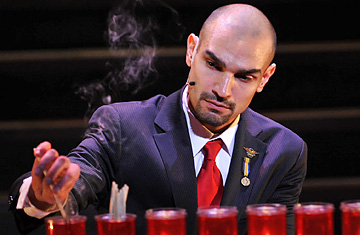
Javier Muñoz in Venice
Awards, I usually feel, are meant to be given out, not hoarded. But I couldn't disagree with the New York Drama Critics' Circle's decision two weeks ago not to present an award this year for Best Musical. It was hard to find a Broadway musical to get behind this season. The ones I enjoyed most — Come Fly Away, American Idiot, Fela! — depended on recycled music and fell a little short as fully realized musical theater. A couple of well-received off-Broadway musicals — The Scottsboro Boys and Bloody Bloody Andrew Jackson — were more interesting but had obvious flaws.
And so, once again, it took a trip outside New York — to Kansas City, Mo., which happens to be my hometown — to find a show to really get excited about. Though early in its creative life, the next major American musical could well be in the making.
Venice, a collaboration between Eric Rosen, artistic director of the Kansas City Repertory Theatre, and composer-performer Matt Sax, is billed as a rap-music version of Othello. That may be a good sell line, but it hardly suggests the richness and power of this work. Rosen and Sax's first collaboration, Clay, was a one-man show about a suburban kid who becomes a rap star. Though Clay won some critical acclaim (I missed it), Venice is a far more ambitious and expansive work, combining elements of Shakespeare, Greek tragedy, Brechtian allegory and dystopian political fable, all enhanced by rap narration and a melodic, rock-influenced score that is one of the most winning I have heard onstage in years.
The show is set in the vague near future, in a fictional city called Venice that has just emerged from 20 years of war. Among the political exiles — dubbed "the Disappeared" — who have returned to the city is a charismatic young leader, also called Venice (even the names in this show have a fablelike resonance), who vows to usher in an era of peace. Opposing him is his treacherous half brother, an Iago figure who plots not only to poison his brother's impending marriage — to a childhood friend, the daughter of one of the city's legendary heroes — but also to plunge the city back into violence in order to keep its police state intact.
Parallels to post-9/11 America are hard to miss, and Rosen has explicitly said the work was partly inspired by the election of Barack Obama. (A chorus of soldiers chanting, "If you see something, say something," is an unintended but prescient echo of the recent attempted bombing in Times Square.) But this is a far more complex and sophisticated political allegory than one has any right to expect from a musical; the generic antiestablishment storyline of Green Day's American Idiot looks like grade-school stuff by comparison. Layers of characters, subplots and backstory unfold in front of us, conveyed with uncommon clarity by the rapping narrator, played by Sax himself.
Indeed, I've never before seen rap music used so well as a narrative device in a stage musical. Whie Sax's rhymes may have less street authenticity than Lin-Manuel Miranda's similar hip-hop narration for In the Heights, they are also less sentimental and carry more operatic grandeur. The other musical numbers, too, propel the story, deepen the characters and heighten the emotional temperature. All along the way, the goal of the show's creators seems to be something rare in musicals, particularly rock musicals: to communicate with the audience rather than provide a string of virtuosic big moments for the singers onstage. This is a musical that gets no ovations until the end.
Which is not to say the performers (mostly imported New Yorkers) are anything short of terrific, especially the understated but imposing Javier Muñoz (who took over Miranda's lead role in In the Heights on Broadway) as Venice and Andrea Goss as his sweet-voiced but strong-willed bride-to-be. Rosen (who directed, wrote the book and co-wrote the lyrics with Sax) has staged the whole thing with both imagination and economy, using text projections and a single set dominated by Greek-style stone steps, with fluid stage movement choreographed by John Carrafa and Tanisha Scott.
The show has just closed in Kansas City, but as a co-production with the Center Theatre Group in Los Angeles, it will resurface at L.A.'s Kirk Douglas Theatre in October. You will undoubtedly be hearing much more from it.
